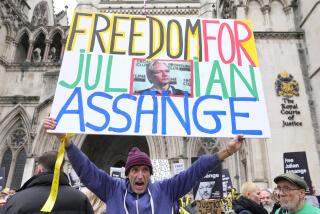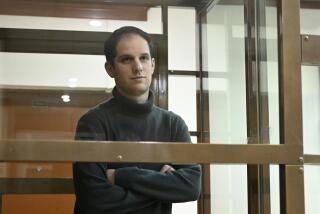Snowden still looking for place to go after ruling out Russia
- Share via
MOSCOW — With his prospects for refuge narrowing, Edward Snowden withdrew an application for asylum in Russia, apparently deciding that he couldn’t abide by President Vladimir Putin’s insistence that he stop leaking U.S. secrets, a Kremlin spokesman said Tuesday.
“True, Snowden did voice a request to stay in Russia,” presidential spokesman Dmitry Peskov told reporters. “At the same time, having found out yesterday about Russia’s position outlined by President Putin … he rejected his intention and his request to get a chance to stay in Russia.”
Putin had said Monday that the former U.S. National Security Agency contractor must stop activities “aimed at damaging our American partners” if he wanted to be granted asylum in Russia.
“As far as we know he is not going to give those up,” Peskov said of Snowden.
Putin had also said that, regardless of Snowden’s application, Russia would not turn him over to U.S. authorities for prosecution.
The WikiLeaks organization, which is helping Snowden, said Tuesday that the fugitive has applied for asylum in 20 other countries, but many of them appear to be unlikely refuges and several announced that they would not accept him. The countries listed by WikiLeaks were: Austria, Bolivia, Brazil, China, Cuba, Ecuador, Finland, France, Germany, Iceland, India, Italy, Ireland, the Netherlands, Nicaragua, Norway, Poland, Spain, Switzerland and Venezuela.
Most of those countries have extradition agreements with the United States, which has issued a warrant for Snowden’s arrest.
On Tuesday, a plane carrying Bolivian President Evo Morales home from a summit of major gas exporters at the Kremlin was rerouted to Austria after France and Portugal refused to let it cross their airspace because of suspicion the Snowden was aboard, Bolivia’s foreign minister told the Associated Press.
Foreign Minister David Choquehuanca denied that Snowden was on the plane, which landed in Vienna. Austrian Foreign Ministry spokesman Alexander Schallenberg told the AP that Snowden is not with Morales and that the Bolivian president was spending the night at a Vienna hotel.
“We don’t know who invented this lie. We want to denounce to the international community this injustice with the plane of President Evo Morales,” Choquehuanca was quoted as saying from Vienna.
Morales had said in an interview with Russia Today television that Bolivia would be willing to consider granting asylum to Snowden.
Among the other remaining possibilities was Venezuela, whose president, Nicolas Maduro, was also at the Moscow summit.
Maduro told reporters that he was unaware of Snowden’s asylum application and intended to return home with “numerous agreements related to investments in the oil and gas sphere” — but apparently not with Snowden. Maduro, a persistent critic of the United States who has inherited the mantle of the late President Hugo Chavez, did praise Snowden for telling “the big truth to prevent wars.”
Polish Foreign Minister Radek Sikorski posted a message on Twitter that he would not grant the request. Brazil, Germany and India were among other countries that said they would not accept Snowden.
Leonid Kalashnikov, deputy head of the foreign relations committee of the lower house of Russia’s parliament, said that Putin doesn’t want to quarrel with the United States over Snowden.
“The way the Kremlin presents it, Putin wants to save face before the nations by not bowing to the United States. But at the same time, he doesn’t want to sacrifice what positive aspects still remain in U.S.-Russian relations over the fugitive,” Kalashnikov said. “I am very sorry for Snowden, who keeps being rejected by the countries he was counting on for protection.
“His situation is dire but not hopeless, as the Kremlin will now do its best to find a safe place for him in a third country.”
The Associated Press was used in compiling this report.
More to Read
Sign up for Essential California
The most important California stories and recommendations in your inbox every morning.
You may occasionally receive promotional content from the Los Angeles Times.













